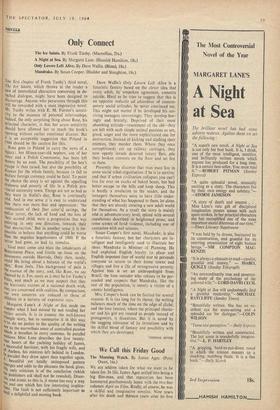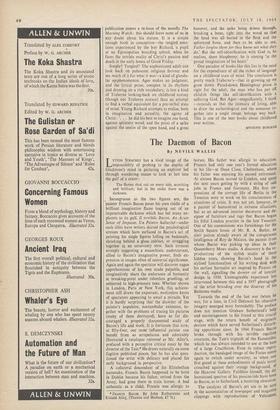We Call this Friday Good
The Morning Watch. By James Agee. (Peter Owen, 16s.)
WE are seldom taken for what we want to be taken for. In life, James Agee settled into being a big film-man, and that reputation has been hammered posthumously home with the two fine volumes Agee on Film. Really, of course, he was a skilful and imaginative novelist. Nine years after his death and thirteen years after its first
publication comes a re-issue of the novella The Morning Watch: this should leave none of us in any doubt about his stature. It is a simple enough book in conception—the tangled emo- tions experienced by the boy Richard, a pupil at an Episcopalian boarding school, when he faces the terrible reality of Christ's passion and death in the early hours of Good Friday.
Simple? Tangled? The sophisticated adult can look back on pubescent religious fervour and see much of it for what it was.1—a kind of glandu- lar epiphenomenon. Agee makes no judgment, and the lyrical prose, complex in its rhythms and drawing on a rich vocabulary, is less a kind of Traherne looking-back on childhood ecstasy (though not Traherne ecstasy) than an attempt to find a verbal equivalent for a pre-verbal state of mind. Young Richard attempts to realise, both in imagination and actuality, the agony of Christ : `. . . he did his best to imagine one hand, against splintery wood, and the point of a spike against the centre of the open hand, and a great hammer, and the spike being driven through, breaking a bone, tight into the wood so that the head was all- buried in the flesh and the splintered bone, and then to be able to say, Father forgive them for they know not what they do.' But the self-identification with God is, he realises, sheer blasphemy; he is sinning 'in the proud imagination of his heart.'
One paradox of books like this lies in the need for the expenditure of all the riches of language on a childhood state of mind. The conclusion is pretty much Traherne's—that in growing up we grow down. Pared-down Hemingway prose is right for the adult, the man who has put off childish things like self-identification with a suffering God. But Agee—magnificently, I think —reminds us that the intensity of living, able to draw the eschatological and the sensuous to- gether into a single image, belongs way back. This is one of the best books about childhood ever written.
ANTHONY BURGESS











































 Previous page
Previous page